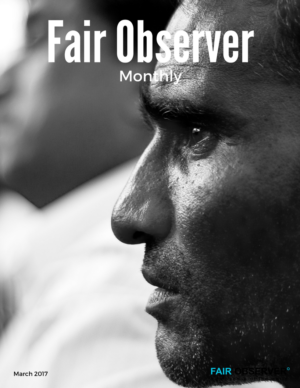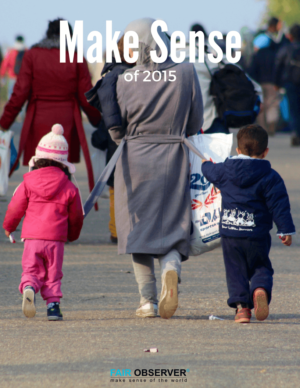Description
Description
Fair Observer Monthly is a chance for you to sit down, look back and think about the month past. A month lasts 28 to 31 days, a suitably appropriate time to take stock of the world. We publish daily on our website and we select some of our best articles every month in our e-magazine. We will give you context and multiple perspectives on issues that matter. We will inform and educate you. Fair Observer Monthly does what we promise: make sense of the world.
This month’s collection of global perspectives touches on politics, environmental issues and social dynamics. Banarsi Babu’s endorsement of Narendra Modi, despite acknowledging his flaws, is an intriguing counterpart to Pooka MacPhellimey’s critique of Rishi Sunak’s blunder-filled campaign. Meanwhile, Luiz Cesar Pimentel’s account of the solidarity following Brazil’s catastrophic floods contrasts with Stephen M. D. Day’s exploration of the intricate and resilient migration patterns of monarch butterflies.
Martin Plaut’s examination of the ANC’s struggle to maintain dominance in South Africa and form a coalition resonates with Leonardo Vivas’s insights on Venezuela’s hopeful yet precarious transition to democracy. Jean AbiNader’s piece on Lebanon’s chaotic political state parallels Reza Parchizadeh’s analysis of the uncertain future of Iranian politics following the untimely death of President Ebrahim Raisi.
Ellis Cashmore’s predicts of political protests during EURO2024 and the Paris Olympics and Nafees Ahmad discusses the role of tribunals in bolstering climate activists. Both address how large platforms and legal frameworks can influence global issues. Mehret Ayalew Mandefro’s documentary review on China’s economic impact in Ethiopia is a stark reminder of how development on paper can differ dramatically from on-the-ground realities, a theme that is also present in Ankit Jain’s advocacy for the statehood of Washington, DC, highlighting the discrepancy between policy and lived experience.
Finally, a cautionary note by Elizabeth Tate on the implications of advanced AI on women’s rights underscores the unforeseen consequences of technological progress, a thread that runs through Peter Isackson and colleagues’ exploration of the shifting dynamics in international payments and dedollarization.
Subscribe to Fair Observer and support independent journalism. As a sustaining member, not only do you support nonprofit media, but you also get many benefits. You will be able to bookmark content, read e-publications, engage in deep discussions and do much more. Sign up today.
Content of Publication
The Truth About Why I Voted for Narendra Modi – Banarsi Babu
Limited Options for South Africa’s ANC After a Devastating Election – Martin Plaut
A Sociologist’s Perspective on the Olympics and EURO2024 as Protest Platforms – Ellis Cashmore
Contradictory Strategies for Achieving Sovereignty and Stability in Lebanon – Jean AbiNader
A New Documentary Highlights China’s Expansion Into Ethiopia – Mehret Ayalew Mandefro
Can Venezuela Suddenly Transition to Democracy? Its People Hope So. – Leonardo Vivas
Post-Raisi Iran: A New Chapter in Iranian Politics – Reza Parchizadeh
One Long Pratfall — Is Rish! Trying to Lose? – Pooka MacPhellimey
Great Compassion Shines in Brazil Following Its Horrific Floods – Luiz Cesar Pimentel
Tribunals Challenge Climate Peril and Can Really Aid Activists – Nafees Ahmad
FO° Crucible: Money Matters in a Multipolar World, Part 5 – Peter Isackson, Alex Gloy, Edward Quince
Is Mainstream Tourism a Good Way to Save Helpless Antarctica? – Lorena del Castillo, Reinier van Oorsouw
What We Know About Monarch Migration: The Amazing “Last Mile” – Stephen M. D. Day
The Heart of America Must Now Become an Official State – Ankit Jain
New AI Is Fun, Attractive and Hazardous for Women – Elizabeth Tate









